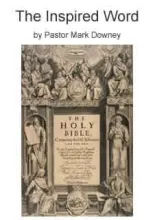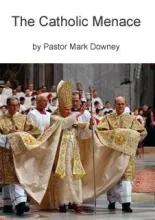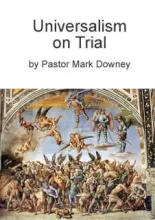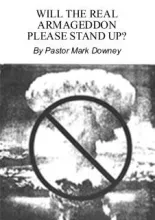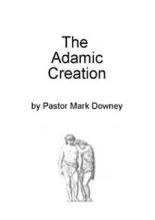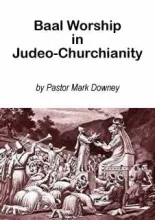The Catholic Menace Part 1
by Pastor Mark Downey
Scripture Reading: Acts 8:9-25
The word ‘menace’ means someone or something that is a dangerous threat that is likely to cause harm. The word ‘catholic’ evokes images of a religion that has been and is a dangerous threat to Christianity that has caused so much misery and suffering and will continue on its path of destruction until it is finally destroyed. I’ve said many times that catholic is not synonymous with Christian nor is it godly or righteous. With a long line of abuses and violations of God’s Word, the catholic religion can only be considered an ongoing and persistent evil. It cannot escape its sordid history. Once a Christian is informed of why the catholic religion is a counterfeit, they will hate it with a perfect hatred.
The catholic menace is conformity to and love of the world, an adversary to the perfect will of God. This message is an expose’ to open the eyes of those who have hitherto been blind to what the Bible calls ‘the mystery of iniquity.’ James 4:4 asked an adulterous crowd, “Don’t you know that friendship with the world is hatred towards God?” Because, “Fear of the Lord is the beginning of knowledge [and wisdom]” Prov. 1:7, 9:10. And “The fear of the Lord is to hate evil” (Prov. 8:13) including, but not limited to evil thoughts, evil words and actions, evil company, evil worship and doctrines, all being contrary to God and His will. Man found out many inventions for ruin, God found One for our recovery, not only Christ revealed to us, but Christ revealed in us. There are no ‘vicars of Christ’ in Christianity as we shall see.
Godly fear being reverential affection for God, which is peculiar to children, is consistent with strong faith, great joy and true courage. So let us bravely approach the catholic phenomenon at its very beginning to know the liberating truth. We recently put ‘Universalism On Trial’ and found the bastard child of catholic doctrines guilty of mangling the truth. Likewise, we shall put forth a preponderance of exhibits that will convincingly condemn the catholic charade.
But, I digress as the catholic gambit was doomed at its very inception. Where do we start is in and of itself an exacerbating discernment as to when the catholic religion was founded and who was its founder. We’ll get to that person in a moment. But, to trace the rise and development of this stupendous institution is to write the whole history of Western Europe. I only have one lifetime, so my focus is to equip the non-catholic saints with enough light to dispel the darkness of catholicism. No doubt there will be a catholic bloat of criticism and reciprocal animus based on trivia and hysteria much like my series on ‘Why We Hate Jews.’ I still get hate mail on that one. But that will not censor the reality of the facts. Throughout the long history of catholic occupation we can see the extinction of empires, the end of religious cultures, the rise of new states, the wars of kings, an evolution of manners, customs and traditions; of philosophy, music and the arts – all make a connection with the history of Rome, which is where the catholic idea started.
The Vatican and the Papacy was never in Jerusalem. Let me paint you a picture of how the Mediterranean world operated at that time to give you a better understanding of how the catholic menace arose after the death and resurrection of Christ. The rise of the Papacy was a time and age that was anything but perfect and abounded with causes tending to corrupt whatever was simple and materialize whatever was spiritual. The jewish worship of symbolism, as if handed down from heaven, had taught the catholic mind to associate religious truth with visible rites and rituals, and to attribute considerably more importance to the observance of the outward ceremony than to the cultivation of the inner man or how a Christian should conduct themselves in having the right mentality, having the mind of Christ.
The Grecian world also with its lavish sensualities, strong emotions and keen perception of beauty was a singularly gross and materialized land. Its hedonistic poetry and sensuous mythology had unhinged the intellect of its people to appreciate the grandeur of spiritual simplicity. Italy was a land of gods and war. The former was engaged in passions while the latter exerted a degrading and brutalizing effect upon the character and genius of our race, withdrawing from pure thoughts and abstract contemplation and thus the degeneracy of the individual and society… thanks to the jewish, Grecian and Roman influence upon them. Under these conditions Christianity encountered an antagonist a thousand times more formidable than the Roman sword. Among this decadent social morass, the Papacy germinated. The various corruptions adapted to the prevailing desires of the land.
The Greek, unable all at once to unlearn the lessons and cast off the yoke of the Academy, attempted to form an alliance between the simplicity of the Gospel and his own subtle and highly imaginative philosophy; while the Roman, loath to think that the heaven of his gods should be swept away as the creation of an unbridled fancy, recoiled from the change, as we would from the dissolution of the material heavens; and, though he embraced Christianity, he still clung to the forms and shadows of a polytheism in the truth and reality of which he could no longer believe. Thus the jew, the Greek, the Roman, was alike in that they corrupted the simplicity of the Gospel; but they differed in that each corrupted it after their own fashion.
So much had been foreshadowed by the parables of Christ, which were intended as illustrations on the nature of the Kingdom and the manner of its progression. "The Kingdom of God does not come with observation" Luke 17:20. "It is like a grain of mustard seed… the least of all seeds; but when it is grown, it is the greatest among herbs, and becomes a tree" Mt. 13:31-32. "It is like unto leaven, which a woman took, and hid in three measures of meal, till the whole was leavened" Luke 13:21. Never was the divine plan of Christianity to displace the old systems, and inaugurate itself on their turf. It was to progress in obedience to the Law which regulates the growth of all great changes. But as yet the time was not come for a pure spiritual Christianity to attain dominion upon the earth. The infantile state of society was not yet ready. As, in the earlier ages, men had not been able to retain, even when communicated to them, the knowledge of one self-existent, independent, and eternal Being, so now they were unable to retain, even when made known to them, the pure spiritual worship of that Being, the Word made flesh in Jesus Christ.
It was to be expected, that after the Gospel's triumph there would come a recoil; that the ancient idolatries, recovering from their panic, would rally their forces, and appear again, not in any of their old forms, for a superstition never revives under its old organization exactly, but under a new form adapted to the state of the world, and the character of the new antagonist now to be confronted. The spiritual began to lose ground before the symbolic and the mythological. The various idolatries which had formerly covered the wide space, which the Gospel now occupied, was subjugated, but not utterly exterminated and began to pay court to Christianity. They professed, as the handmaids, to do homage to the mistress; but their design in this insidious friendship was not to aid her in her glorious mission, but to borrow her help, and so reign in her place. The Magian (Persian) religion wooed her in the East; Paganism paid court to her in the West: Judaism, too, esteeming, doubtless, that it had a better right than either, put in its claim to be recognized. Each brought her something of its own, which, it pretended, was necessary to the perfection of Christianity.
Judaism brought her dead symbols; the Magian and Greek philosophies brought her refined and subtle, but dead speculations and doctrines; and the Paganism of Rome brought her dead divinities. On all hands she was tempted to part with the substance, and to embrace again the shadow. Thus the old idolatries did muster under the banner of Christianity. They rallied in her support, so they professed; but, in reality, to unite their arms for her overthrow. In Popery we find the predominating traits of the Grecian philosophy, more especially in the subtle cause of the Popish schools, combined with a sensuous ritual, the celebration of which is often accompanied, as in Greece of old, with gross licentiousness.
And last of all, there is obviously present in Popery the polytheism of ancient Rome, in the gods and goddesses, which under the title of saints, fill up the calendar and crowd the temples of the Romish Church. Here, then, all the old idolatries live again. There is nothing new about them except the organization, which is more perfect and complete than ever. The name of Popery, truly, is Legion! "There are many antichrists," said the apostle John; for in his days the various systems of error had not been combined into one. But the Roman apostasy ultimately acquired the dominion and marshalling the other heresies beneath its banner, gave its own name to the motley host, and became known as the antichrist of prophecy and of history. Popery, then, was to be an off-shoot of Paganism, whose deadly wound, dealt with by the spiritual sword of Christianity, was healed. Its oracles had been silenced, its shrines demolished, and its gods consigned to oblivion; but the deep corruption of a wicked imagination, not yet cured by the zealous commission of the Spirit upon all flesh, revived it anew, and under a Christian mask, reared other temples in its honor, built it another Pantheon, and replenished it with other gods, which in fact, were the ancient deities under new names.
All idolatries, in whatever age or country they have existed are to be viewed as successive developments of the one grand apostasy. That falling away began in Eden, and was consummated at Rome. It had its rise in the plucking of the forbidden fruit; and it attained its zenith in the supremacy of the Bishop of Rome, Christ's Vicar on earth. The hope that he would "be as God," led man to commit the first sin and that sin was perfected when the Pope "Opposed and exalted himself above all that is called God, or that is worshipped; so that he, as God, sits in the temple of God, showing himself that he is God" II Thes. 2:4.Popery is but the natural development of this great original transgression. It is just the early idolatries ripened and perfected. It is manifestly an enormous expansion of the same intensely malignant and fearfully destructive principle which these idolatries contained.
The ancient Chaldean worshipping the sun, the Greek deifying the powers of nature, and the Roman exalting men into gods, are but varied manifestations of the same evil principle, namely, the utter alienation of the heart from God, it is prone to hide itself amid the darkness of its own corrupt imaginations, and to become a god unto itself. That principle received the most fearful development which appears possible on earth, in the Mystery of Iniquity which came to be seated on the Seven Hills of Rome; for therein man deified himself, became God, nay, arrogated powers which lifted him high above God. Popery is the last, the most matured, the most subtle, the most skillfully contrived, and the most essentially diabolical form of idolatry which the world ever saw, of which, there is reason to believe, it ever will see. It is the greatest calamity, next to the Fall in Eden, which ever befell the family of Adam.
The first clergy of the Roman Church aspired to no rank above their brethren. The labors in which they occupied themselves were the same as those of the ordinary ministers of the gospel. As pastors, they watched with affectionate fidelity over their flock; and, when occasion offered, they added to the duties of the pastorate the labors of the evangelist. All of them were eminent for their piety; and some of them added to the accomplishments of the scholar; Clemens of Rome for example, although he has been called a Pope, he was more likely a humble Bishop and being friends of Peter and Paul. He was the most distinguished Christian writer, after the apostles, of the late first century. Even after the Gospel made its way into the city of Rome, paganism maintained its ground amongst surrounding villages. Accordingly, it became the first care of the pastors of the metropolis to plant the faith and found churches in the neighboring towns. They were led to embark in this undertaking, not from the worldly and ambitious views which began, in course of time, to propel their successors, but from that pure zeal for the spread of Christianity for which these early ages were distinguished. It was natural that churches founded in these circumstances should cherish a peculiar veneration for the men to whose pious labors they owed their existence; and it was equally natural that they should seek them for advice in all cases of difficulty. That advice was at first purely paternal and implied neither superiority on the part of the person who gave it, nor dependence on the part of those to whom it was given. Later on, when the Episcopate at Rome came to be regarded by worldly men, lovers of the preeminence, at first voluntarily rendered ministers as equals, but the homage was exacted as a right; and the advice, at first simply fraternal, took the form of a command, and was delivered in a tone of authority.
Such was the state of affairs in the first century, during which the authority of the presbyter or bishop, for these two titles were employed in the primitive church to distinguish the same office and the same order of men, and did not extend beyond the limits of the congregation to which they ministered. A presbyter was a grassroots structure from the bottom up; the opposite of a pyramidal order where authority was from the top down, like the Masonic all-seeing eye on a dollar bill. But in the second century another element began to operate. In that age it became customary to regulate the consideration and rank which the bishops of the Christian Church enjoyed, by that of the city in which they resided. It is easy to see the influence and dignity which would therefore accrue to the bishops of Rome, and the prospects of grandeur and power which would thus open to the aspiring officials who occupied that seat of authority.
Rome was the mistress of the world. During ages of conquest her dominion had been gradually extending, till at last it had become universal and supreme; and now she exercised a mysterious and potent charm over the nations. Her laws were received, and her sway submitted to, throughout the whole civilized earth. The first Rome was herein the type of the second Rome; and if the spectacle which she exhibited of a centralized and universal despotism did not suggest to the aspiring religious officials of the capital, the first ideas of a spiritual empire, centralized and universal in which they began with great vigor and craft to prosecute. It acted as a secret but powerful stimulant upon the minds of the Roman bishops themselves, and it operated with all the force of a spell cast upon the imaginations of those over whom they now began to arrogate power.
Here we discover one of the grand springboards of the Papacy. As the free states that formerly existed in the world had rendered up their wealth, their independence, and their deities, to form one colossal empire, why, asked the bishops of Rome, should not the various churches throughout the world surrender their individuality and their powers of self-government to the metropolitan center of Rome, in order to form one mighty Catholic Church? Why shouldn’t Christian Rome be the fountain of law and of faith to the world, as Pagan Rome had been? Why should not the symbol of unity presented to the world in the secular empire be realized in the real unity of a Christian empire? A very tempting proposition indeed. If the occupant of the temporal throne had been a king of kings, why shouldn’t the occupant of the spiritual chair be a bishop of bishops? That the bishops of Rome reasoned in this way is a historical fact. The Council of Chalcedon established the superiority of the Roman Papacy on this very ground. "The fathers," they contended, "justly conferred the dignity on the throne of the presbyter of Rome, because that was the imperial city." They thought the mission of the Gospel was to unite all nations into one family. The satan-adversaries presented the world with a mighty counterfeit of this union, when they united all nations under the despotism of Rome, and thus, by counterfeiting, they might defeat the reality of the Kingdom of God.
The rise of Provincial Ecclesiastical Councils proceeded in the same way. The Greeks were the first to adopt the plan of assembling the deputies of the churches of a whole province to deliberate on affairs of consequence. The plan, in a short period of time, was received throughout the whole empire. The Greeks called such assemblies Synods; the Latins termed them Councils, and styled their laws or resolutions as Canons. In order to temper the deliberations and to execute the resolutions of the assembly, it was required that one should be chosen as president; and the dignity was usually conferred on the presbyter of greatest weight for his piety and wisdom so that the tranquility of the Church might not be disturbed by annual elections. The person nominated by his brethren to the presidential chair was in it for life. He was regarded only as the first among equals, but the title of Bishop began now to acquire a new significance and raised itself above the humble appellation of Presbyter. The election to the office of perpetual president fell frequently upon the bishop Rome and thus the equality that reigned among the pastors of the primitive Church came to be still further disturbed.
The fourth century found the Church government with a perpetual president of the Provincial Synod, a rank of equal honor and a title of equal dignity were enjoyed by all the pastors or bishops of the Church. But this century brought great changes along with it, and paved the way for still greater changes in the centuries that followed it. Under Constantine the empire was divided into four divisions with substructures of diocese and provinces. In making this arrangement, the state acted within its own province, but it stepped out of it altogether when it began to fashion the Church upon the model of the Empire. The ecclesiastical and civil arrangements were made, as nearly as possible, to correspond with each other. The first distinct recognition of the order occurs in the Council of Constantinople in 381AD. At that time we find but three of these great dignitaries in existence: the Bishops of Rome, Antioch, and Alexandria, but a fourth was added. The Council, taking into consideration that Constantinople was the residence of the Emperor, decreed "That the Bishop of Constantinople should have the prerogative, after the Bishop of Rome, because his city was called New Rome."
In the following century, the Council of Chalcedon declared the bishops of the two cities on a level as regarded their spiritual rank. But the practice of old Rome was more powerful than the decree of the fathers. Despite the rising grandeur of her formidable rival to the east, Rome continued to be the one city on earth to hold the foremost place among the patriarchs of the Christian world. In no time, wars broke out between these four spiritual potentates. Alexandria and Antioch threw themselves upon the patriarch of the west for protection and making concessions enhanced the importance of the Rome even more. This rise of rank necessarily led to a rise of jurisdiction and power. As might have been foreseen, the seat of the prince of the patriarchs was Rome. A promotion which aimed at making the civil and ecclesiastical arrangements exactly to correspond, and which fixed the chief seats of the two authorities at the same places, made it inevitable that the high priest of all Christendom should appear nowhere but at the metropolis of the Roman world; even though that high rank was nailed to the Cross with all the other Levitical ordinances of the temple. It was now seen what a tower of strength Rome had become. Her prestige alone had lifted her bishop from the humble rank of presbyter to the preeminent dignity of arch-patriarch and in this she gave the world a pledge of the future dominion and grandeur of her Popes. A sound policy would have dictated the necessity of preserving intact the spiritual element. But, with a most infatuated persistency, the very opposite policy was pursued. Christianity was robbed of divine rights and bound with the trappings of state. The spiritual was chained, while the carnal was freed. Doesn’t the Bible say, “To bind their kings with chains, their nobles with fetters of iron”? For all intents and purposes, the ecclesia, the called out ones of God were defunct in the eyes of Rome, just as we are today. There was no Melchisedec priesthood recognized by the establishment church then or now. Christian Identity embraces it as our rightful heritage.
The condition which makes it possible for both church and state to preserve their independence and vigor is not incorporation, but coordination. But, this begs the question of why theocracy succeeds or fails. All former attempts at amalgamation have ended in the dominancy of the one principle, the subservience of the other, and the corruption and injury of church and state, spiritual and civil orders, whereby the absolute supremacy of one over the other negates a true theocratic government or a nation ruled by God’s Laws. The American model had this idea also; to have a clergy watching over the political. The checks and balances ordained by God. This was the admonition Paul was giving to the Christians in Romans 13, “Let every soul be subject to the higher powers. For there is no power but of God. The powers that be are ordained of God.” The coordination is within the body politic or ecclesia of those called of God to bring forth the Kingdom of He who has the only rank that matters, King Jesus.
When, after a few centuries, the Christians in Rome drifted away from this principle and elevated man to the position of Pope. Had God’s order for society been understood, the Papacy could never have arisen. The transgression met a reciprocal judgment for the State, which had begun by enslaving the Church, was itself enslaved in the end by that very arrogance and ambition which it had taught the Church to cherish. And thus the story of the decline of Christianity and the rise of the Papacy. Rome had the art to turn all things to her advantage. There was nothing that fell out that did not minister to her growth, and help onward the accomplishment of her vast designs: the rivalry of sects, the jealousies of churchmen, the intrigues of courts, the growth of ignorance and superstition. It seemed as if the natural operation of events was suspended in her case, and that what to other systems brought nothing but evil, to her brought only good fortune. No wonder that blinded nations mistook her for a god, and prostrated themselves in adoration. But, it was not the divine goodness of her power, but the terror struck upon the good; a reverse of Romans 13 to strike terror unto the evil.
The disputes which arose in the churches of the east favored the pretensions of the Roman Church, and helped to pave the way for universal domination. The germinating superstition of the times, owing principally to the prevalence of Platonic philosophy, from the subtle discourse and specious reasoning of which Christianity suffered far more than she did from the persecuting edicts of emperors likewise aided the advance of the Papacy. This superstition, which was nothing but the revived paganism of a former age, continued to increase from an early part of the third century and onward. The simplicity of the Christian faith began to be corrupted by a heathen mentality, and the worship of the Church burdened by ridiculous and idolatrous ceremonies. When the Church exchanged the catacombs for the magnificent edifices of wealth, she exchanged also the simplicity of life and purity of faith, of which so many memorials survive to this day. Already, in the 4th century, we find images introduced into churches, the bones of martyrs hawked about as relics, the tombs of saints become the resort of pilgrims, and monks and hermits swarming in various countries. We find the pagan festivals, slightly disguised, adopted into the Christian worship; the homage offered anciently to the gods transferred to the martyrs; the Lord's Supper dispensed sometimes at funerals; the probable origin of masses; and the churches filled with the blaze of lamps and candles, the smoke of incense, an atmosphere of perfume, and the overt show of gorgeous robes, crosiers, mitres, and gold and silver vases; reminding one of the similar spectacles which might be witnessed in the pagan temples.
"The religion of Constantine," remarks Gibbon in his ‘Decline and Fall of the Roman Empire’, "achieved in less than a century the final conquest of the Roman empire; but the victors themselves were insensibly subdued by the arts of their vanquished rivals." The people were excluded from all share in the administration of affairs, the rights and privileges of the presbyters were invaded, while the bishops, who had usurped the powers of both people and presbyters, contended with one another respecting the limits of their respective jurisdictions, and imitated, in their manner of living, the state and magnificence of princes. Hence it came to pass that at the conclusion of this century there remained no more than a mere shadow of the ancient government of the Church. There was one critical moment where the errors of the past and the prevention of more tremendous errors in the future, galled by the yoke of ceremonies, evinced the Christian people to desire a return to the simplicity of early times. They needed only a powerful voice to call that feeling into action. Many eyes were already turned to one whose commanding eloquence made him the most conspicuous person of his times. The destiny of ages hung on the decision of Augustine. Had he declared for reform, the history of the Papacy might have been cut short; the ambitions, the bigotry and despotism, the fanaticism and cruelties, and the carnage of so called saints might never have existed. But the Bishop of Hippo hesitated and gave his voice in favor of the growing superstition. All was lost. The history of the Church becomes from that hour little better than the history of superstition, hypocrisy, knavery, and blood. The jurisdiction thus conferred on the Roman bishop over the west was submitted to with reluctance: it received only a partial submission from the churches of Africa, and was successfully resisted for some considerable time by those of Britain and Ireland. Another well-marked stage in the rise of the ecclesiastical supremacy is 445AD. In that year came the memorable edict of Valentinian III and Theodosius II, in which the Roman pontiff was styled the "Director of all Christendom," and the bishops and universal clergy were commanded to obey him as their ruler. Universalism begets the dictator of all abominations.
The code of Justinian, which had been published a few years before this time was now the law of Western Europe. The ecclesiastical supremacy had now a legal existence, but it had to translate it into the real world. So vast a power, extending over so many interests, and over such a multitude of persons, and covering so large a portion of the globe, no imperial fiat could create; it grew unabated like toxic weeds. Planted by councils, buttressed by edicts, with a congenial element of vitality and increase in the thickening superstition of the times, it made rapid progress. Its faults, be they ever so great, never lacked apologists. Its wealth converts enemies into friends; the timid grow courageous in its cause; and the indifferent and lukewarm find a hundred reasons for being active and zealous in its service. The cause of Rome was the rising cause, and therefore it enjoyed all these advantages with a dexterity and skill which have never elsewhere been equaled. Monarchs were incited to quarrel with one another while Rome stood by till the conflict was ended and then, siding with the stronger party, she divided the spoils with the victor.
At last, the empire of the west was dissolved and took the Caesars out of the way. It compelled the bishops of Rome, now deprived of the imperial influence which had hitherto helped them so mightily in their struggles for pre-eminence, to fall back on another element, and that an element which constitutes the very essence of the Papacy, and on which is founded the whole complex fabric of the spiritual and temporal domination of the Popes. The rank of Rome, as the seat of government had lifted her bishop to a proud preeminence above his peers. Rome would have fallen with her bishop, had he not, as if by anticipation of the crisis of maintaining the transition from secular to religious power, reserved till this hour, the masterstroke of his policy. He now boldly cast himself upon an element of much greater strength than that of which the political convulsions of the times had deprived him, namely, that the Bishop of Rome is the successor of Peter, the prince of the Apostles, and, in virtue of being so, is Christ's Vicar on earth. In making this claim, the Roman pontiffs vaulted at once over the throne of kings to the seat of gods.
In the middle of the fifth century, we find the fundamental dogma of the Papacy, that the Church is founded on Peter, and that the Popes are his representatives, proclaimed by the Council of Chalcedon, and virtually sanctioned by the silence of the church fathers. As a further proof that the Popes had now shifted their dignity from an imperial to a pontifical foundation, we may instance the case of Hilary, the successor of Leo, who accepted as a title to which he had unquestioned right, the appellation "Vicar of Peter, to whom, since the resurrection of Christ, belonged the keys of the kingdom." The divine right was put in their domain, as the only basis of power which neither lapse of years nor change of circumstances could overthrow. Rome was henceforward indestructible. The claim of succession from Peter as the one true and only Church was not only damage control, but a Big Lie that would carry its influence for centuries much in the same vein as the Big Lie that jews are Israel.
Not only is the catholic premise of its founding flawed chronologically, because Peter was never in Rome (in fact, Christ commissioned Peter to become chief minister to the circumcised in Judea, not to uncircumcised gentiles/nations like Rome, Gal. 2:7-8), but its founding is obfuscated by two simultaneous, concurrent churches of Rome; one being authentic and the other a counterfeit that became the Roman Catholic Church (RCC). Are catholic apologetics so stupid to not know that Paul wrote the epistle to the Romans and not Peter? Paul established the only true church at Rome during the apostolic eraand said, "I long to see you, that I may impart unto you some spiritual gift, to the end ye may be established" (Rom. 1:11). Amazingly, the Church at Rome had not been established officially even by 55 or 56AD. However, the catholics would have us believe that Peter had done this some ten years before in the reign of Claudius. The Apostle Paul distinctly informs us that Peter was not in Rome in 65AD even though catholics say he was. Paul said: "Only Luke is with me" (II Tim. 4:11). The truth becomes very plain. Paul wrote to Rome; he had never mention Peter, but at the last moment says: "Only Luke is with me." Peter, therefore, was never the Bishop of Rome! At the times the Catholics believe Peter was in Rome, the Bible clearly shows he was elsewhere. As previously mentioned there are many supposed historical accounts of Peter in Rome, but none of them are firsthand accounts and should not be put above the many witnesses of the Word. Near 45AD, we find Peter being cast into prison at Jerusalem (Acts 12:3, 4). In 49AD, he was still in Jerusalem, this time attending the Jerusalem Council. About 51AD, he was in Antioch where he got into differences with Paul because he wouldn’t sit or eat with gentiles. Strange that the "Roman Bishop" would have nothing to do with gentiles in 51AD! Later in about 66AD, we find him in the city of Babylon among the Judahites (I Pet. 5:13). Remember that Peter was the Apostle to the circumcised. Why was he in Babylon? Because history shows that there were as many Judahites in the Mesopotamian areas in Christ’s time as there were in Palestine. In the book of Romans, Paul was not even writing to the Italians, but rather Carodoc, the king of Britain, and his royal Christian household who were taken captive and exiled to Rome. Paul called them “kinsmen” because Carodoc was the father of Claudia, the wife of Rufus, who had the same mother as Paul and thus his half brother.
There was a Simon Peter (a Samaritan) in Rome after the death of Christ, but it was not the apostle Peter (an Israelite). The great false church system of Rome had its beginning in the day of the apostles of Christ. Unfortunately, this conflict did not go its separate way but tried mixing into one religious system. This is why there are so many pagan ideas and doctrines in the RCC. Some concepts crept in over time but many were there from the very beginning. The first conflict between early Christianity and the false religion of paganism i.e. Catholicism, was recorded in Acts 8:9-25. This quarrel happened between a pagan high priest named Simon Magus and the apostles Peter and Philip. The reason Luke describes the intentions of this man so thoroughly is the profound effect he and his followers had on God’s Church in Asia Minor, Greece, and especially Rome. Actually, this man by 62AD (when Luke composed the book of Acts) had caused the true Church so much trouble that Luke had to show the people that he was NOT as he claimed to be, a part of the Christian Church. Pastor Elmore has covered most of this in his sermon ‘What Is Wrong With Catholicism?’ One point that should be noted is there is a mixing of several religious ideas. This is one of the identifying characteristics of the beast of Rev. 13 that is identified as the RCC. Revelation 13:2 “Now the beast which I saw was like a leopard, his feet were like the feet of a bear, and his mouth like the mouth of a lion.”
The four beasts used to make up the beast in John’s vision are the same four beasts Daniel saw in his vision in Chapter 7. As a matter of fact, papal Rome inherited from each of these pagan empires some of their basic identifying traits that we still see practiced in this modern day false system of religion, the RCC. From Babylon, the lion, the papacy inherited a pagan priesthood; from Medo-Persia, the bear, sun worship; from Greece, the leopard, human philosophies; and from the dragon, Pagan Rome, its power, seat and great authority. As stated in Rev. 13:2 the mixing of these pagan ideas of the RCC had its onset from the very beginning. From this Simon Magnus who was well versed in all of these abominable doctrines and false system of worship created the early Catholic Church. These abominable doctrines can be traced back to the very beginning through Simon Magnus. Even though there is only one event that was recorded by Luke, it would not be unreasonable to assume that Simon had heard the apostle on several occasions. He likely also spoke with many of the new converts of the new church. It could be said that Simon Magus had great interest in spiritual matters and most likely was very well versed in both jewish teaching and that of the new Christian church. Simon had mixed judaism, early Christianity and Babylonian, Greek and paganism into one religion and appointed himself as the leader. Here we see the well documented mixing of religions from several historical sources and The Bible itself. What did he do with this new religion? History shows that Simon Magus did not stay in Jerusalem but moved to Rome. Simon only used the name of Christianity to bring about his own desired ends. From these historical accounts we see that indeed Simon Magnus was in Rome and was the head of his own universal catholic church. In many of these accounts we also see that Simon Magnus was also considered by many to be God. Does that not fall into place that the first Pope aka Simon Magus was considered to be God. There are several places in The Bible that show that the Church of Rome would commit the sin of blasphemy and demand worship from men i.e. Rev.13:4, 14:11.
In John 10:33, The Bible clearly gives the definition of blasphemy, “…a mere man, claiming to be God”. The list of blasphemy coming from the Papacy would fill volumes of books. Here are just a few examples: “The Pope is not only the representative of Jesus Christ, but he is Jesus Christ himself, hidden under a veil of flesh” - The Catholic National, July 1895; “The Pope is of so great dignity and so exalted that he is not a mere man, but as it were God, and the vicar of God” - The Catholic Encyclopedia. There is no doubt that Simon Magus was called a god. Neither is there doubt that the Papacy claims that the Pope is God on Earth. The idea of Apostolic Succession is based upon an impersonator of Simon Peter. One of the main pillars and foundation of the RCC is the idea of Apostolic Succession. This is false and is based upon the wrong Peter. This is their claim to power and the claim that they are the true church.
But the true Peter gave us prophetic warnings about the catholic church in that very significant part of Acts 8. Peter perceived that Simon was in the "gall of bitterness, and in the bond of iniquity [lawlessness]" in verse 23. This verse has been misunderstood because the King James Version fails to give the full force of Peter’s accusation. This verse when understood in the manner Peter intended is one of the most important of the whole chapter. It is a prophecy! Peter knew the mind of this man and what this man was to become. Peter rebuked him in strong prophetic terms, concealed in the ordinary translation: the Greek means ‘thou art FOR a gall of bitterness and a fetter of unrighteousness [lawlessness]’, i.e. a cause of bitterness and corruption to others. Peter was saying that Simon was a person whose influence would be like bitter gall or poison. Not only was Simon, in Peter’s time, a great antagonist to the Church, but he would be the adversary of the future. According to Strong's Concordance, the word translated "gall" (#5521) is actually the poppy plant. Simon was a sorcerer and they practiced sorceries, which can also be drug related. There’s some truth to religion, not Christianity, being the opiate of the people. Jesus refused to drink it even on the Cross (Mt. 27:34) in order to teach us not to harbor bitterness in our hearts, no matter how trying our circumstances become. Bitterness drugs the mind and prevents us from putting on the mind of Christ. It prevents us from truly understanding God’s Law, which is necessary to inherit the promises. No wonder Jude later says, speaking about the very men who followed Simon Magus, "For there are certain men crept in unawares, who were before of old ordained to this condemnation" (v. 4). It is by identifying the real beginning of the great false church system with this Simon that opens up a whole new perspective of understanding regarding the greatest menace to Christianity, the fraud which began even in the infancy of the 1st century Church.
Racially, Simon Magus was a Samaritan (Acts 8:9), who were Babylonians, whom the Bible tells us worshipped that Tower of multicultural diversity in Babel, who would gravitate away from Christian values of separation and discrimination. This universalism of religious cultures and a later modernized version of racial amalgamation was the philosophy of the RCC from its inception, because it was not founded by a racially pure Israelite. It was the Babylonian Semiramis, the mother and wife of negro ruler Nimrod, who were both deified god and goddess, the former called Venus and the ‘Queen of Heaven’, a portent of future Mary worship. Simon tried to buy holiness, thinking the miracles of the Holy Spirit were trade secrets of the Disciples; he even got baptized; all of which the catholic church practices in its enticements of becoming a catholic through opulent architecture and rituals, the heart of idolatry is basically repackaged golden calves. These Samaritans who were transported to the area where Northern Israel once lived before their captivity didn't have sense enough to realize that the true God of the land had sent Israel into captivity because of their calf-worship and their whoring after the strange gods of aliens. Notice what God says about the final condition of these Samaritans. "So these nations feared the Lord [calling themselves God’s people], AND served their graven images, both their children, and their children’s children: as did their fathers [the Babylonians], so do they unto this day" (II Kings 17:41). These people called themselves the worshippers of the true God, but were actually Babylonian idolaters. This was the kind of mixed-up society Simon Magus grew up in. The prototype for the RCC was Babylon itself. Today’s modern catholic thinks they are worshipping the true God of the Bible and that they are the true church. This is based on a lie and God says, “Because they received not the love of the truth… for this cause God shall send them strong delusion, that they should believe a lie” II Thes. 2:10-11. In Part 2 we will take a look at the sordid history of these catholic lies and any reasonable person will see that it cannot be Christian.

 "For thou art an holy people unto the Lord thy God: the Lord thy God hath chosen thee to be a special people unto himself, above all people that are upon the face of the earth."Deuteronomy 7:6
"For thou art an holy people unto the Lord thy God: the Lord thy God hath chosen thee to be a special people unto himself, above all people that are upon the face of the earth."Deuteronomy 7:6
